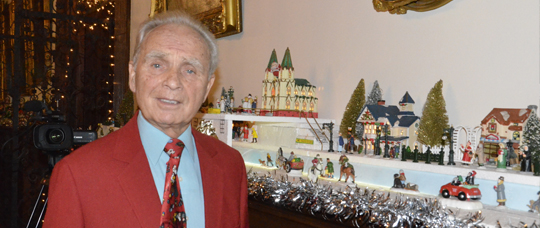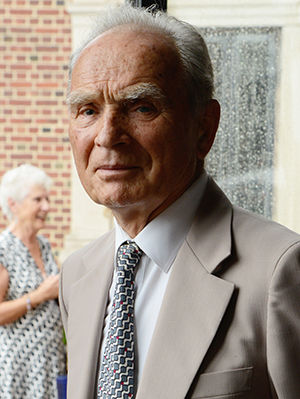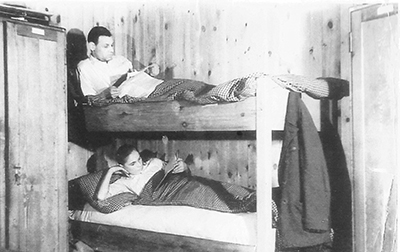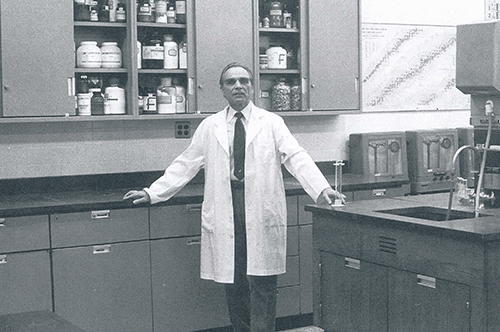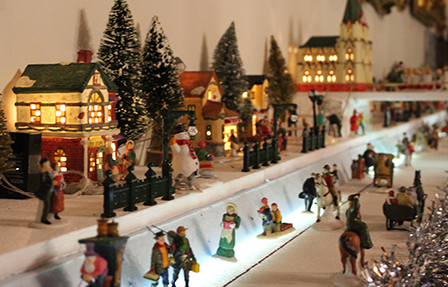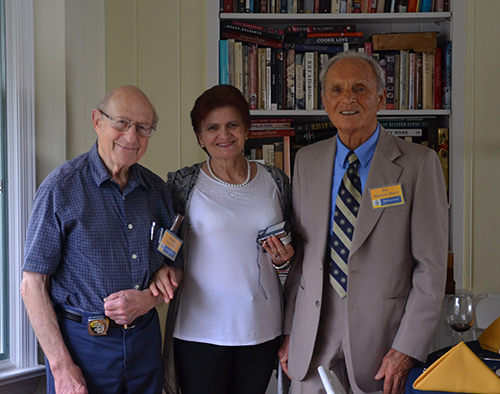We are sorry to announce the passing of Joseph Mazurek (Hon.) on March 30th, 2021. Please take a look back on Joe’s life and days at Webb by reading the following story that was written by Professor Richard Harris, the Assistant Dean and Director of Humanities, for the 2017-18 Annual Report.
This article appears on page 44-46 of the 2017-18 Annual Report.
At Webb just about everyone has heard of “Joe Maz.” Joe Mazurek: the Lab Technician, the man with the European accent, the “older guy” who always attended the spring-semester ski trips, the person who made the name signs for the faculty offices in STH, the jokester who often had a wry comment about what was going on, and the person who for many years orchestrated an elaborate Christmas display in the Visconti Reception Room. He was that staff member who was always eager to help. Probably few Webbies, however, know about Joe’s life story, which is a fascinating tale.
Most Webb Family members know that Joe came to the U.S. from Poland. His early life there was typical of the lives of many men born in Poland in 1925. His father was a mason, who later worked on bridge construction. His mother stayed at home for the most part, tending to six children, though she was also a midwife and an art teacher. According to Joe, his childhood was rather conventional until September 1, 1939, when Germany invaded Poland, thus beginning the Second World War. Throughout and after the war Poland found itself caught between two of the great powers of the time, Germany to the west and Russia/the Soviet Union to the east. Both would have a significant impact on Joe’s life.
Joe remembered vividly the news that the Germans were approaching his village outside Warsaw; first, word that they were 20 kilometers away, then only one. His first sight of the Germans was two motorcycles with side cars, both with mounted machine guns, roaring into his village. Another of his childhood memories involved the men in the village throwing their rifles down a well, so the Germans, who had overrun the area, would not find them armed and execute them. On a freezing winter night, however, Joe was lowered by rope into the well to retrieve the rifles, so they could be hidden again, buried in the local cemetery. He and two older men involved in the plot were subsequently questioned by German soldiers and an officer who ordered them to be taken away. Another German officer stepped in, however, and separated Joe from the others, telling him to run away as fast as he could. The other two men were led into the woods and shot.
From 1942 to 1945, Joe was in a German work camp outside Warsaw. The accompanying photograph, taken in 1942, when Joe was seventeen, shows him on the lower bunk of the barracks in that camp. He does not talk about the hardships, rather about how he made these years of his life into something positive. The men there were part of a force of factory workers turning out large artillery pieces. Here Joe really began to learn about industrial design and production from the experienced machinists.
Joe was always interested in the way things work. And this interest is what finally brought him to Webb, though by a rather circuitous path. When the war ended in 1945, Joe was ready to move on and learn more, and he found employment in a Polish Navy shipyard. On November 6, 1945, he was on a Polish destroyer that was rammed by a tug in a heavy fog. Joe was in the water for over an hour before being rescued. His spine and knee injuries meant that he was no longer able to work in the shipyard. Luckily, Joe renewed a friendship that he had made in the work camp, and the friend’s father was a professor at the University of Gdańsk. Joe met with the friend’s father, signed a paper (which in itself is another story), and then spent two years preparing to go to the Polytechnic University. Finishing at the Polytechnic University, Joe then earned a Master of Technology degree from the University of Warsaw, and soon after was working again in a shipyard in Gdańsk. He then worked out of Gdańsk for both the Polish Ocean Line and Polish Rescue companies.
If the German invasion of Poland had been a major influence on the Joe’s earlier years, the Soviet takeover of Poland in the post-war period determined the next years of Joe’s life. Despite his degrees in engineering and technology, Joe was assigned less important jobs and was not allowed to advance at the shipyard. The reason was simple: He would not join the Communist Party. On the one hand, he did not agree with the Soviet ideology; on the other hand, he wanted to come to America, and he knew that if he did become a member of the party, in the Cold War climate following the war, he almost certainly would be denied entrance. So, for four to five years, Joe traveled the world, teaching students on Polish naval vessels how ships worked. During that period, he earned his license as a Navy Officer-Mechanic. Then, at a port call in Holland, he decided to jump ship and try to make his way to the U.S. He had a sister who had already come to Long Island, and his wife, a doctor, was already working at a hospital in Brooklyn. For six months in Holland, he “disappeared,” avoiding attempts by the Polish shipyard and the Dutch police to find him. Finally, he fulfilled his dream of coming to America when he made it to New York on an immigrant visa and began looking for a job. Someone he met took him to J. J. Henry, but that company could not hire him because he was not a U.S. citizen and thus could not work in a shipyard involved in U.S. Navy contracts. He did, however, find employment with Todd Shipyard in Brooklyn, which fortunately for him had a general manager named Mr. Kochanczyk ’41. He had a sixteen-year career at Todd.
And then Joe’s life took another turn. One of the managers at Todd played golf with Admiral Russell Bryan who served as President of Webb Institute at the time. Before long, Joe was being shown around the Webb campus by Jacques Hadler. He decided to take a job as a Lab Technician. The year was 1983. Now thirty-five years later, Joe has returned to Poland, where he has visited old friends and made many new ones over the years.
As we look back over Joe Maz’s years at Webb, a couple of things stand out. He loved the ski trips, though he didn’t learn to ski until after he came to Webb. He also knew how to skate, although one of his most amusing stories is how he feigned not knowing how to skate, just so he could be “taught to skate” by an instructor he fancied. After treating her to lunch, the pair returned to the rink, where Joe momentarily forgot that he “didn’t know how to skate”: he made a turn that gave him away. He says she seemed even more impressed with his ruse than with the turn.
I‘m pretty sure that all of us who were at Webb between 1998 and 2008 remember that Joe ran the New York Marathon on numerous occasions, the first of which was at the age of seventy-three. The Monday after each marathon he would eat lunch in his running outfit, proudly displaying his medal. His first run would have made for a Sports Illustrated classic. Having learned that he had won an at-large lottery spot only weeks before that year’s marathon, he began training by running up to eight miles a day. (This training regimen left another eighteen miles to contend with.) His night-before, pre-run meal consisted of two cheeseburgers, a couple of gin and tonics, and polka dancing at Glen Cove’s Polish Hall. He awoke at 4 a.m. on the day of the marathon so he could arrive to Staten Island in time for the beginning of the race. He felt that he did pretty well for the first eleven miles—and then the cramps set in. He had to stop numerous times to massage his legs. One of his worst moments, even considering the pain in his legs, came when he dumped a paper cup of what he thought would be water over his head to cool off. Unfortunately, it was orange juice. A swarm of flies accompanied him to the finish line. He ran the marathon nine times between 1998 and 2008 and planned to run a tenth, but in October and November 2009, he was instead caring for a friend who was ill. That was typical of Joe.
Joe’s holiday displays have brightened the Reception Room for eighteen years! Joe says that in 2000, he spoke with President Ron Kiss ’63 about displaying decorations he owned in the Visconti Reception Room. Joe envisioned decorating the window sills in the alcove looking out over the Sound. President Kiss liked the idea, and, turning to the opposite wall adjacent to the Lenfest Gallery, he said, “Joe, you can have this whole wall.” So, Joe—of course— started looking for more decorations. He found a store on Route 110 that displayed decorations on sale and told the sales rep, “Here’s $50. Hold all of them for me. I’ll be back to pick them up.” Almost $2,000 later, Joe had the collection of most of the figures we’ve seen for the past eighteen years. He assures me that he will return to Webb during the 2019 Thanksgiving break to set up this display for the nineteenth time. He can’t stay away from Webbies for too long; they have been his “family” for years.
The story of the Christmas decorations exemplifies his energy and generosity and positive spirit. Years ago, I commended Joe for one of his many good deeds and expressed to him that it was nice to know someone so good-natured and generous. His reply to me was this: “Professor, anyone who has seen what I have seen in my life, knows why it is so important for us to be positive and good to each other.” That comment, as much as anything, probably captures and explains the Joe Maz I’ve known.
Joe’s giving spirit has made him a General Admiral level supporter of the Campaign for Webb. Through his estate and subsequent gifts, Joe has established The Joseph Mazurek Scholarship Fund, a fund that will provide need-based support for room-and-board scholarships. Also, Joe has made a generous gift to the new Academic Center that enables Webb to establish the Jacques Hadler Faculty Conference Room.

